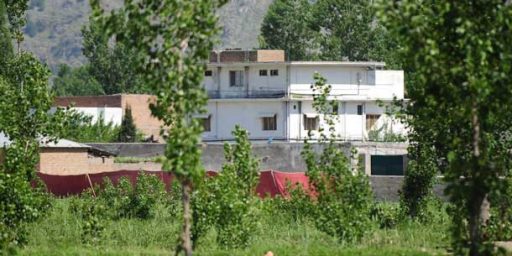London Bombers Not Al Qaeda?
Were the men who killed 52 people in the 7/7 London bombing just “lone gunmen” rather than members of an organized terrorist network? Yes, according to a NYT report of a London Observer report of a UK Home Secretary report.
A forthcoming government report concludes that the July 7 bombings in London were a low-budget operation carried out by four men who had no connection to Al Qaeda and who obtained all the information they needed from the Internet, The Observer reported Sunday. According to The Observer, which said it obtained a leaked copy of the report, the attacks were “a simple and inexpensive plot” organized and executed by four British suicide bombers intent on martyrdom.
[…]
The Observer said the report, compiled by a senior civil servant on behalf of Charles Clarke, the Home Secretary, discounts the theory that anyone else was involved in the July 7 attack. After the bombings, the police found the bombers’ car parked and full of explosives at the Luton train station, giving rise to the suspicion that a fifth bomber was at large.
The four men — Mohammad Sidique Khan, Hasib Mir Hussain, Shehzad Tanweer and Germaine Lindsay — were inspired in part by Mr. Khan’s visits to Pakistan, according to The Observer’s account of the report, although, the paper said, his meetings with Pakistani militants were ideological rather than logistical. The men used relatively low-power explosives that they had built for just several hundred pounds, the Observer reported, quoting a government official as saying that “the London attacks were a modest, simple affair by four seemingly normal men using the Internet.”
If true, this blows conventional wisdom all to hell.
Update: Mark Townsend, interestingly the paper’s crime correspondent, has the story for the Observer.
The official inquiry into the 7 July London bombings will say the attack was planned on a shoestring budget from information on the internet, that there was no ‘fifth-bomber’ and no direct support from al-Qaeda, although two of the bombers had visited Pakistan. The first forensic account of the atrocity that claimed the lives of 52 people, which will be published in the next few weeks, will say that attacks were the product of a ‘simple and inexpensive’ plot hatched by four British suicide bombers bent on martyrdom.
Far from being the work of an international terror network, as originally suspected, the attack was carried out by four men who had scoured terror sites on the internet. Their knapsack bombs cost only a few hundred pounds, according to the first completed draft of the government’s definitive report into the blasts.
The Home Office account, compiled by a senior civil servant at the behest of Home Secretary Charles Clarke, also discounts the existence of a fifth bomber. After the bombings, police found an unused rucksack of explosives in the bombers’ abandoned car at Luton station, which led to a manhunt for a missing suspect. Similarly, it found nothing to support the theory that an al-Qaeda fixer, presumed to be from Pakistan, was instrumental in planning the attacks.
A Whitehall source said: ‘The London attacks were a modest, simple affair by four seemingly normal men using the internet.’
Confirmation of the nature of the attacks will raise fresh concerns over the vulnerability of Britain to an attack by small, unsophisticated groups. A fortnight after 7 July, an unconnected group of four tried to duplicate the attack, but their devices failed to detonate.
Indeed, given the ease at which public places can be attacked and the seemingly large supply of fanatics willing to do the killing, it is surprising these attacks are so rare.






We had a report about our own “terrorist group” (killing of van Gogh, death threats for Ayaan Hirsi Ali, etc.) and they concluded the same. Homegrown, no Al Quaida connections.
Let’s take this to the next step. The Van Gogh murder in the Netherlands, the Madrid bombing, and the London incident are all determined not to be the work of Al-Qaeda (whatever that means). Does this mean that Al-Qaeda isn’t a threat? Or that there is no threat? Does it mean that the threat is a lot greater than previously supposed and will, consequently, be much harder to deal with?
Does it mean that, in a time of superempowered individuals and alienation, more attention needs to be paid to people who are predisposed simultaneously to feelings of entitlement and grievance?
I don’t have any answers just questions. But I’d certainly be interested in hearing your thoughts, James. If you can take time out from posting about beauty pageants, that is ;-).
It does not make any difference if these bombers were or were not AlQueida. They subscribed to the radical actions of AlQueida and the radical philosophy of Muslim Extremist.
The idea that home grown terrorists did this with no input from outside influence is ludicrous.
I would suggest the findings contain a level of political correctness just as the Spanish findings.
This finding also gives cover to the intelligence agencies who missed the signs and used radicals as sources of information.